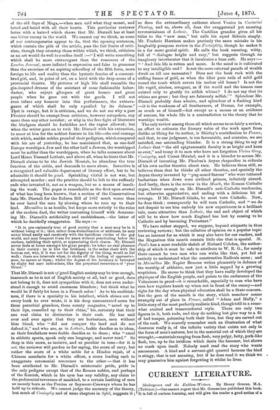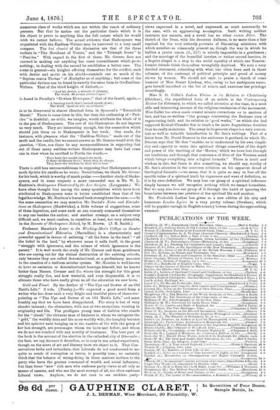CURRENT LITERATURE.
Shakespeare and the Emblem-Writers. By Henry Greene, MA. (Triibner.)—One cannot regret that Mr. Greene has published this book. It is fall of curious learning, and will give the reader a good notion of a
numerous class of works which are not within the reach of ordinary persons. But that he makes out the particular thesis which it is his object to prove to anything like the full extent which he would wish we cannot believe. The actual evidence that Shakespeare was acquainted with the Emblem-Writers may be narrowed to a very small compass. The loci classici of the discussion are that of the three caskets in "The Merchant of Venice," and the "Triumph Scene" in "Periclea." With regard to the first of these, Mr. Greene does not succeed in making out anything but mere resemblances which prove nothing, in dealing with the second he establishes a better case. The scene in general—six knights offering themselves for the conflict, each with device and motto on his shield—reminds one as much of the Septem contra Thebes "or lEschylus as of anything ; but some of the particular devices can be found in exactly the same form in the Emblem- Writers. That of the third knight, of Antioch,—
" And his device, a wreath of chivalry The word, We pompte proverit apex,' " is found in Paradin's "Devises HeroIques ;" that of the fourth, again,— " A burning torch that's turned upside down; The word, 'Quest me alit, me exttnouit,"
is to be discovered in almost identical form in Symeoni's " Tetmstichi 3Iorali." There is some force in this, but then the authorship of "Peri- cles " is doubtful ; no critic, we imagine, would attribute the whole of it to the pen of Shakespeare. The rest of the illustrations do not impress us very much. They are interesting enough, but the connection which should join them on to Shakespeare is but weak. One reads, for instance, with pleasure what the " Emblem-Writers " made out of the moth and the candle, but we cannot answer as Mr. Greene would wish the question, "Now, can there be any unreasonableness in supposing that out of these many emblem-writers Shakespeare may have had some one in view when he ascribed to Portia the words,—
' Thus hath the candle singed the moth.
0 these deliberate fools! when they do choose, They have the wisdom by their wit to lose.'"
There is still less unreasonableness in supposing that Shakespeare saw a moth fly into his candle as he wrote. Nevertheless, we thank Mr. Greene for his book, which is worthy of much praise. —Another study of Shake- speare, and in some respects a more successful one, is Mr. W. L. Rushton's Shakespeare Illustrated by the Lex Scripta. (Lougmans.) We have often thought that among the many specialities which have been attributed to Shakespeare none is better established than that of his legal knowledge. Mr. Rushton's learned book strengthens the case.—In the same connection we may mention Mr. Daniel's Notes and Emenda- tions on Shakespeare (Hardwicke), a little volume of suggestions, some of them ingenious, and some such as can scarcely commend themselves to any one besides the author; and another attempt, on a subject very difficult and, we must confess, to ourselves at least, not very attractive, in the Sonnets of Shakespeare Solved, by H. Brown. (J. R. Smith.)































 Previous page
Previous page